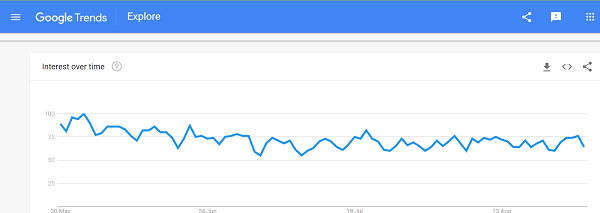Writer's block. All bloggers face it from time to time. You run out of ideas for blog posts and hit a mental wall. And if you're new to blogging, you might wonder how you'll be able to keep on coming up with new ideas.
Don't sweat it! Even Shakespeare came out of a period of creative slowdown to finish King Lear. You, too, can churn out content to keep your audience engaged with these seven ways to find blog post ideas 🙂
You'll also need something to stay organized - a content calendar.
Think Like Your Audience
Think about who will be reading your post. Check out some groups directly related to the subject of your blog. These groups will be populated by people with shared values, shared problems, and similar likes, interests, and passions.
What might be occupying their minds? What problems are they trying to solve? What do they care about? Make a long list of as many of these things as you can.
Spend time on popular online discussion forums (Quora, Reddit, IGN Boards, OnlyTech). Visit popular blogs in your field and check the comments section of the latest posts. Also, note the social share counts.
The idea is to get a sense of the issues first and foremost in your audience's minds.
Create a shortlist of topics to write about for the coming weeks or months. Keep aside other ideas for later.
Ask Your Readers
No, really. If you've already built up a moderate readership, crowdsourcing blog post ideas from them isn't a cop-out. It's an exercise in engagement and brand marketing. It reinforces your commitment to providing them with the information they want and need.
Here are some ways to elicit responses from your readers:
- A simple 'What would you like to learn more about?' at the end of the posts you've already published should provide you with a few ideas in the comments section.
- Run a week-long campaign on social media focusing on answering fans' and followers' burning questions. Get ideas from their interactions with you and credit them in the posts you write.
- Create a survey questionnaire around a few topics in your field. You can opt for multiple-choice or open-ended questions that require participants to write a sentence or two.
An example of a multiple-choice questionnaire for a parenting blog:
What parenting topic interests you most currently?
- Gender reveal parties
- Authoritative parenting
- Gender-neutral parenting
- Online support services
When writing posts with ideas crowdsourced from your readers, you could mention that your post has been inspired by the current needs and interests of the community.
Brainstorm with People
The best bloggers have boundless curiosity about their passions and the world in general. While the internet is a goldmine of information, there's a lot to be gained from interacting with people—both inside and outside of your normal circles.
To gather ideas and insights for blog posts, make a list of the people you know are interested in the topic of your blog. Probably, they also know you have a blog! The only thing that's left to do is to contact them and ask for ideas.
Check Out Trending Topics
A standard tip from marketing experts and experienced bloggers is to be aware of trending topics and use them to drive traffic to your blog. Popular tools you can use to find trending topics online include:
While working with trending topics is a tried and tested method, it shouldn't be your primary go-to method for generating blog post ideas.
Here's why:
It's not always easy, and in some cases, impossible to tie a trending topic to your blog. Trying to force a relationship or connection between the two can come off as awkward.
Trending topics work best when you can make the most of them to create posts that are truly interesting to your readers.
For example, the sale of consumer tech products and board games soared during the pandemic, creating opportunities for affiliate marketers and hobby bloggers in those fields/niches.
'The best board games to play with your family during lockdown' featured in many blogs, media websites, and newspapers.
'Must-haves for pandemic remote work' also scored big as people and firms scrambled to adapt to the new normal.
COVID-19 is still getting millions of online searches more than a year into the pandemic, although in different ways. Google Trends point to a higher interest in knowing about new COVID-19 variants, mask mandates, and vaccine efficacy.

If you happen to be a travel blogger, you have the chance to address these queries.
Here are some examples:
At the time of writing this article, a search for 'pandemic travel' on Quora, generated the following ideas.
When choosing a trending topic as a blog post idea, consider these questions:
See What Top Bloggers in Your Niche are Up To
Keep a tab on the top bloggers in your field. Their content can help spark off ideas for your blog. It's okay to be inspired by topics already covered by other bloggers so long as your posts have unique content and you write them in your unique voice and style.
What exactly are you looking for when you visit top blogs in your niche?
After you’ve identified a few post ideas, you have the opportunity to make your post better or distinct from existing ones. Here are some ideas:
You can also make use of the comments section on posts that have a lot of engagement. Are there questions that are not answered in the post? Are there suggestions about what else could have been covered?
Identify Evergreen Topics
Some topics will always be popular. Planning a perfect beach holiday, saving money, finding love. There are endless examples.
What are the evergreen topics in your niche? Have you covered them previously, and if so, how long ago? You can repurpose an existing post to reflect your readers' new needs. Try to position the post differently while retaining the main message. Trim, expand, modify and improve to create a brand new post.
Evergreen posts can be:
- Guides
- How-to’s
- Opinions
- Contemporary topics
- Checklists
- Best and worst practices
Evergreen posts are not:
- News and trends
- Content that becomes quickly outdated (ex: The Hottest Songs Ruling the BillBoard)
- Statistics
Review an evergreen post for language and SEO. For example, was a previous post you wrote a bit too technical for your audience? You can make the post lighter and easier to understand this time around. Optimize the post and hyperlink to other posts on your blog to improve SEO.
Read
Prolific bloggers are voracious readers. Consume online and offline content (newspapers, books, magazines, print advertisements, and so on) as regularly as possible to help keep ideas flowing. When you find something interesting that you can use for your blog, note it down on your phone/PC/ or on a notepad. Research the topic and gauge how it might interest your audience.
The advantage of this approach is that you will find new ideas that other bloggers in your niche haven't yet explored. It will help you stand out as different and interesting among your existing audience while attracting new readers at the same time.
Build a Content Calendar
A content calendar, used by digital marketers, is equally useful for bloggers for the following reasons:
Create your calendar in Google Sheets or similar. A typical template contains the following information:
You can add more columns to include other information for each post (ex: source of the idea). You can even use color-coding to indicate the performance of each post (comments, social media shares, click-throughs to an affiliate product page, and so on).
The calendar should also contain your evergreen posts from the past. You can return to these timeless articles as and when needed.
In Closing
Coming up with new blog post ideas doesn't have to be hard. Use the tips shared in this post to take your blogging game to the next level and attract more readers 🙂




